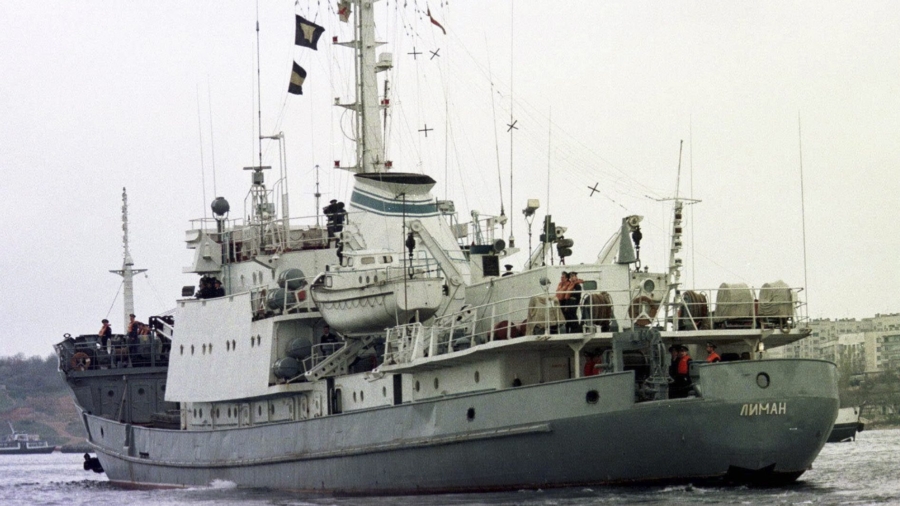A Russian spy-ship has returned to international waters off the south-eastern coast of the United States and is engaging in unsafe activities, according to the Coast Guard, The Washington Times reports.
The Viktor Leonov, a Russian surveillance ship, was reported to have been sailing off the coast of South Carolina for the last few days with no lights and was not responding to commercial vessels trying to avoid collisions.
On Dec. 15, the Coast Guard in Charleston, South Carolina, issued a maritime safety information bulletin regarding the ship’s activities, and advised all vessels to “maintain a sharp lookout and use extreme caution when navigating in proximity to this vessel.”
“The United States Coast Guard has received reports indicating that the RFN Viktor Leonov (AGI-175) has been operating in an unsafe manner off the coast of South Carolina and Georgia,” the notice cited by The Washington Times said.
“This unsafe operation includes not energizing running lights while in reduced visibility conditions, not responding to hails by commercial vessels attempting to coordinate safe passage and other erratic movements,” it added.
The Leonov, described as a Russian auxiliary general intelligence ship (AGI), regularly patrols international waters along the eastern coast of the United States and has operated in the region since 2015.
It takes its name from the Soviet navy officer and two-time hero of the Soviet Union, is fitted with a variety of high-tech spying equipment, and is designed to intercept signals intelligence.
CNN reported in 2017 that the Russian vessel also routinely operates in the Caribbean, including Cuba, and Trinidad and Tobago.
A defense official told the publication that the U.S. Navy’s USS Mahan, an Arleigh Burke-class destroyer, had been operating in close proximity to the Russian ship.
The Viktor Leonov is suspected to be spying on undersea internet cables, known as submarine communications cables, as well as U.S. military bases, Washington Times columnist Bill Gertz said.
These cables are laid on the sea bed throughout the world’s oceans, spanning a network of 683,508 miles. They carry 99 per cent of international data, including Internet traffic and military communications.
However, fears over Russia cutting, disrupting, or “wiretapping” the cables have grown over the years amongst officials, the BBC reported in 2017.
Meanwhile, the Viktor Leonov is not the only Russian spy-ship which has been operating in waters close to the United States.
Last month, the controversial Russian Navy ship, the Yantar, suddenly appeared in the Caribbean, off the coast of Trinidad and Tobago after previously having been suspected of placing listening devices on undersea communication cables.
The ship, which the Russian Navy described as an “oceanographic research vessel,” had previously broadcasted its position on the Automated Identification System (AIS) to avoid collisions.
However, before turning up in the Caribbean, the ship had not been visible for about a month after it left port, sparking concern among officials about its activities, Forbes reported.
News of the Viktor Leonov comes just days after Russian Foreign Minister Sergey Lavrov’s visit to the Oval Office, where he reportedly raised concerns about the United States potentially dismantling the last remaining nuclear arms treaty between the two powers—the Obama-era New START treaty after the Trump administration decided to abandon the 1987 Intermediate-Range Nuclear Forces (INF) Treaty that banned the development of ground-launched missiles with a range of 500–5,500 kilometers (310–3,400 miles) this year.
Just had a very good meeting with Foreign Minister Sergey Lavrov and representatives of Russia. Discussed many items including Trade, Iran, North Korea, INF Treaty, Nuclear Arms Control, and Election Meddling. Look forward to continuing our dialogue in the near future! pic.twitter.com/tHecH9a9ck
— Donald J. Trump (@realDonaldTrump) December 10, 2019
The move could potentially reignite a U.S.-Russia arms race.
Last month, Lavrov accused Washington of “evading any serious discussion, making public discouraging signals regarding the future of this [New START] treaty” during a press conference in Moscow.
Meanwhile, some analysts have accused the United States of being asleep at the wheel over the past 15 years as China—which was not part of the INF Treaty—has been quietly building up its intermediate-range missile capabilities.
Defense analyst Tim Walton, a research fellow at the Center for Strategic and Budgetary Assessments, previously told The Epoch Times, “Because China wasn’t part of the INF treaty, it had amassed the world’s largest and most sophisticated arsenal of ground-launched intermediate-range missiles, with a range of different ballistic and cruise missiles that could be fired from the ground and could hold different targets, including U.S. allies and partners as well as U.S. forces throughout the Indo-Pacific, at risk.”
Epoch Times reporter Simon Veazey contributed to this article.
From The Epoch Times

